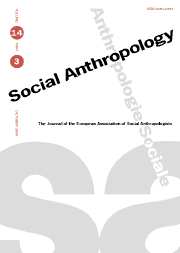Fieldwork in a post-colonial anthropology. Experience and the comparative
Published online by Cambridge University Press: 03 June 2005
Abstract
In the epistemological reflexivity characteristic of recent work, there has been a relative negligence of the experience of intensive fieldwork. Yet, it is in explicating the structure and nature of relationships which constitute fieldwork, linking rapport and empathy as anthropological experience to historically located, social experience and a self-reflexivity of the anthropological/fieldworker self that we can renew the methodology of intensive fieldwork in the making of anthropological understanding and anti-colonial ethnography. This is explicated through a comparative ethnography of one fieldworker in two fieldsites, widely divergent in time, place, and fieldwork techniques. In both the contexts of Rajasthan, India and Leiden, The Netherlands, the separate self-interests of the observer and the observed in listening, hearing, telling and doing created the limited mutuality vital to processes of anthropological learning and analysis.
Dans la réflexivité épistémologique qui caractérise les travaux récents, l'expérience d'un travail de terrain intensif a relativement été négligée. Cependant, c'est en expliquant la structure et la nature des relations qui constituent l'enquête de terrain, en reliant les rapports et l'empathie en tant qu'expérience anthropologique à une expérience sociale historiquement située, et à l'auto-réflexivité de l'anthropologue/de l'enquêteur de terrain que l'on peut renouveler la méthodologie d'un travail de terrain intensif dans l'élaboration d'une compréhension anthropologique et d'une ethnographie anti-coloniale. Ceci est expliqué à travers une ethnographie comparative d'un chercheur enquêtant dans deux terrains à des moments, des lieux et des méthodologies très différents. A la fois au Rajasthan (Inde) et à Leiden (Pays-Bas), les intérêts distincts de l'observateur et de l'observé à écouter, entendre, dire, et faire créent un sens de réciprocité essentiel pour les procédés d'analyse et d'apprentissage anthropologique.
In der für jüngste Arbeiten charakteristischen epistemologischen Reflexivität ist eine relative Vernachlässigung intensiver Feldforschungserfahrungen zu konstatieren. Gerade in der Auseinandersetzung mit der Struktur und Natur von den Beziehungen, die Feldforschung ausmachen, dem Verbinden von Rapport und Empathie als anthropologische Erfahrungen mit historisch lokalisierten, sozialen Erfahrung sowie der Selbstreflexivität des anthropologischen Selbst/Feldforschers können wir die Methodologie intensiver Feldforschung zwecks anthropologischen Verstehens und anti-kolonialistischer Ethnographie erneuern. Dies wird in der vergleichenden Ethnographie einer Feldforscherin erörtert, die an zwei verschiedenen Orten tätig war, die zeitlich, räumlich und die Forschungstechniken betreffend weit auseinander liegen. In den Kontexten von Rajasthan in Indien und Leiden in den Niederlanden schufen die verschiedenen Selbstinteressen der Beobachterin und der Beobachteten beim Zuhören, Hören, Erzählen und Tun die beschränkte Gegenseitigkeit, die für Prozesse der authropologischen Wissensfindung und Analyse unerlässlich sind.
En la epistemología reflexiva de la investigación reciente hay cierta negligencia en la experiencia del trabajo de campo intensivo. Empero, es posible renovar la metodología del trabajo de campo intensivo hacia un entendimiento antropológico y una etnografía anticolonial al explicar la estructura y naturaleza de las relaciones que constituyen el trabajo de campo, vinculando el ‘rapport’ y la empatía, una experiencia antropológica, con una experiencia social, históricamente ubicada, y una postura auto-reflexiva del yo antropológico/investigativo. Esto se explica por medio do una etnografía comparativa hecha por la investigadora en dos campos de estudio diversos, en lugares y tiempos completamente diferentes, con distintas técnicas de investigación de campo. En Rajasthan, India, y Leiden, Países Bajos, los diferentes intereses individuales de la investigadora y el investigado al escuchar, oír, narrar y conducirse, crean una mutualidad vital para los procesos de aprendizaje y análisis antropológico.
- Type
- Research Article
- Information
- Copyright
- © Cambridge University Press 2005
Footnotes
- 23
- Cited by


